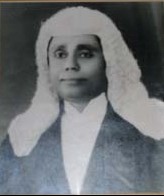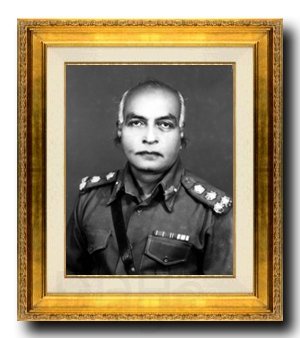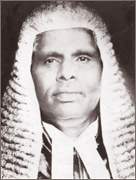Related Research Articles
A bar association is a professional association of lawyers as generally organized in countries following the Anglo-American types of jurisprudence. The word bar is derived from the old English/European custom of using a physical railing to separate the area in which court business is done from the viewing area for the general public.
A President's Counsel is an eminent lawyer who is appointed by the President of Sri Lanka as an individual "learned in the law". The term is an honorific that replaced the Queen's Counsel (QC), which Sri Lanka ceased appointing when it became a republic in 1972. It is equivalent to the appointment of a King's Counsel in the United Kingdom and other Commonwealth realms, and that of Senior Counsel in Commonwealth republics, bearing the same privileges, such as sitting within the Bar of court.

A. W. H. Abeyesundere, QC was a Sri Lankan lawyer, independence activist, former acting Attorney General of Sri Lanka and judge of the Supreme Court of Sri Lanka.
The chief justice of the Democratic Socialist Republic of Sri Lanka is the head of the judiciary of Sri Lanka and the Supreme Court of Sri Lanka. Established in 1801, the chief justice is one of ten Supreme Court justices; the other nine are the puisne justices of the Supreme Court of Sri Lanka. The post was created in 1801. The chief justice is nominated by the Constitutional Council, and appointed by the president. The first chief justice was Codrington Edmund Carrington. The 47th and current chief justice is Jayantha Jayasuriya.

Sir Frank Utu Ofagioro Kabui, GCMG, CSI, OBE KStJ was the Governor General of the Solomon Islands from 7 July 2009 to 7 July 2019.
Upawansa Yapa PC was the 37th Solicitor General of Sri Lanka.
Deshamanya Hector Wilfred "Harry" Jayewardene, QC was a prominent Sri Lankan lawyer. In 1979 he was chairman of a UNESCO conference on human rights in Bangkok and later chairman of the Sri Lanka Foundation Institute. He was member at the United Nations Commission on Human Rights.
Saleem Marsoof, PC is a Sri Lankan judge and lawyer. He is a judge of the Supreme Court of Sri Lanka and former President of the Court of Appeal. He is also a non-resident Justice of Appeal of the Supreme Court of Fiji.
Mervyn Fonseka, OBE, KC (1897–1946) was a Sri Lankan lawyer. He was the 15th Solicitor General of Ceylon.

Brigadier Donald Danister Hewagama (1926-2009) was a Sri Lankan lawyer. He was the Judge Advocate General of the Sri Lanka Army.
Srikumaradas Charles Shirley Corea was a Sri Lankan politician. He was the 9th Speaker of the Parliament and a Member of Parliament, representing Chilaw. He was a member of the United National Party of Sri Lanka.

Chellappah Nagalingam, KC was a leading Ceylonese judge and lawyer. He was a Judge of the Supreme Court of Ceylon and served as acting Governor-General of Ceylon in 1954. He also served as acting Chief Justice, acting Legal Secretary and Attorney General. He was the first Ceylon Tamil to be appointed to the bench of the Supreme Court of Ceylon. He is also considered as the founder of Hindu College Colombo
Kanagasabapathy J. Sripavan is a Sri Lankan Tamil lawyer and judge. He was Deputy Solicitor General, judge and president of the Court of Appeal, Puisne Justice of the Supreme Court of Sri Lanka and the 44th Chief Justice of Sri Lanka.

Nihal Mahendra Sudrikku Jayawickrama is a Sri Lankan academic. He was the former Permanent Secretary to the Ministry of Justice (1970–1977), Professor of Law at University of Hong Kong (1984–1997), Ariel F Sallows Professor of Human Rights at the University of Saskatchewan, Canada (1992–1993), and Executive Director of Transparency International (1997–2000). He is now an independent legal consultant, and has been the Coordinator of the UN-sponsored Judicial Integrity Group since 2000.
Elson Kaseke (1967–2011) was a Zimbabwean lawyer. A long-time resident of Belize, he served that country in a variety of capacities including as a legal draftsman and as Solicitor-General before becoming an attorney in private practice there.
Robert Rasiah Crossette-Thambiah was a leading Ceylon Tamil lawyer and Solicitor General.
Hugh Norman Gregory Fernando, OBE was Sri Lanka lawyer and judge. He was the 33rd Chief Justice of Ceylon and had served as Legal Draftsman of Ceylon.
Hema Henry Basnayake, QC was the 31st Chief Justice of Ceylon as well as the 29th Attorney General and 16th Solicitor General. He was appointed in 1956 succeeding acting Chellappah Nagalingam and was Chief Justice until 1964.

Edward Frederick Noel Gratiaen, was a Ceylonese lawyer and judge. He was a former Attorney General of Ceylon and puisne judge of the Supreme Court of Ceylon.
Douglas St. Clive Budd Jansze, was Ceylonese lawyer. He was the 31st Attorney General of Ceylon and Solicitor General of Ceylon.
References
- 1 2 3 4 Hewagama, Ranjit. "Curriculum Vitae" (PDF). hewagama.net. Retrieved 2012-04-22.
- 1 2 "Raid on Solicitor General's Office". Solomon Times. 2007-06-26. Retrieved 2012-04-22.
- 1 2 3 4 "Legal draftsman sacked". Radio Australia. 2007-07-05. Retrieved 2012-04-22.
- ↑ "Warning against forces undermining Solomon Islands legal system". Radio New Zealand International. 2006-01-23. Retrieved 2012-04-22.
- ↑ "President of Bar Association sacked". Islands Business. 2007-07-04. Retrieved 2012-04-22.
- ↑ "Cabinet Not Consulted in Sacking, Sources Revealed". Solomon Times Online. 2007-07-05. Retrieved 2012-04-22.
- ↑ Rence, Ender (2007-07-18). "Hewagama Yet to Challenge Sacking" . Retrieved 2012-04-22.
- ↑ Maeava, Rachel (2007-08-25). "Moti Should Step Down: Bar Association". Solomon Times. Retrieved 2012-04-22.
- ↑ "SITF elects new members". Solomon Star. 2010-06-22. Retrieved 2012-04-22.